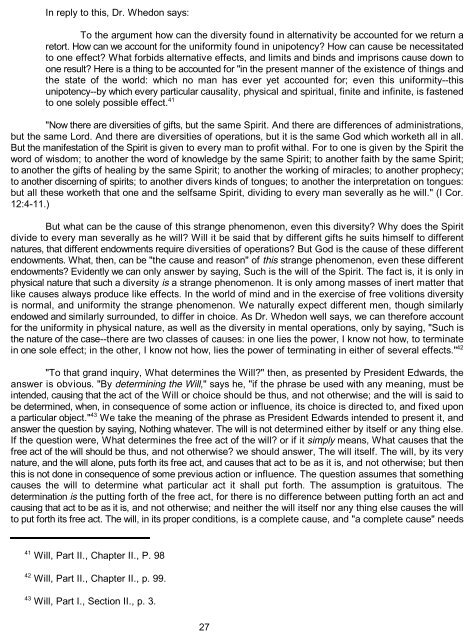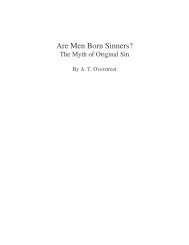Foreknowledge by Joel Hayes - Library of Theology
Foreknowledge by Joel Hayes - Library of Theology
Foreknowledge by Joel Hayes - Library of Theology
You also want an ePaper? Increase the reach of your titles
YUMPU automatically turns print PDFs into web optimized ePapers that Google loves.
41<br />
Will, Part II., Chapter II., P. 98<br />
42<br />
43<br />
In reply to this, Dr. Whedon says:<br />
To the argument how can the diversity found in alternativity be accounted for we return a<br />
retort. How can we account for the uniformity found in unipotency? How can cause be necessitated<br />
to one effect? What forbids alternative effects, and limits and binds and imprisons cause down to<br />
one result? Here is a thing to be accounted for "in the present manner <strong>of</strong> the existence <strong>of</strong> things and<br />
the state <strong>of</strong> the world: which no man has ever yet accounted for; even this uniformity--this<br />
unipotency--<strong>by</strong> which every particular causality, physical and spiritual, finite and infinite, is fastened<br />
to one solely possible effect. 41<br />
"Now there are diversities <strong>of</strong> gifts, but the same Spirit. And there are differences <strong>of</strong> administrations,<br />
but the same Lord. And there are diversities <strong>of</strong> operations, but it is the same God which worketh all in all.<br />
But the manifestation <strong>of</strong> the Spirit is given to every man to pr<strong>of</strong>it withal. For to one is given <strong>by</strong> the Spirit the<br />
word <strong>of</strong> wisdom; to another the word <strong>of</strong> knowledge <strong>by</strong> the same Spirit; to another faith <strong>by</strong> the same Spirit;<br />
to another the gifts <strong>of</strong> healing <strong>by</strong> the same Spirit; to another the working <strong>of</strong> miracles; to another prophecy;<br />
to another discerning <strong>of</strong> spirits; to another divers kinds <strong>of</strong> tongues; to another the interpretation on tongues:<br />
but all these worketh that one and the selfsame Spirit, dividing to every man severally as he will." (I Cor.<br />
12:4-11.)<br />
But what can be the cause <strong>of</strong> this strange phenomenon, even this diversity? Why does the Spirit<br />
divide to every man severally as he will? Will it be said that <strong>by</strong> different gifts he suits himself to different<br />
natures, that different endowments require diversities <strong>of</strong> operations? But God is the cause <strong>of</strong> these different<br />
endowments. What, then, can be "the cause and reason" <strong>of</strong> this strange phenomenon, even these different<br />
endowments? Evidently we can only answer <strong>by</strong> saying, Such is the will <strong>of</strong> the Spirit. The fact is, it is only in<br />
physical nature that such a diversity is a strange phenomenon. It is only among masses <strong>of</strong> inert matter that<br />
like causes always produce like effects. In the world <strong>of</strong> mind and in the exercise <strong>of</strong> free volitions diversity<br />
is normal, and uniformity the strange phenomenon. We naturally expect different men, though similarly<br />
endowed and similarly surrounded, to differ in choice. As Dr. Whedon well says, we can therefore account<br />
for the uniformity in physical nature, as well as the diversity in mental operations, only <strong>by</strong> saying, "Such is<br />
the nature <strong>of</strong> the case--there are two classes <strong>of</strong> causes: in one lies the power, I know not how, to terminate<br />
in one sole effect; in the other, I know not how, lies the power <strong>of</strong> terminating in either <strong>of</strong> several effects." 42<br />
"To that grand inquiry, What determines the Will?" then, as presented <strong>by</strong> President Edwards, the<br />
answer is obvious. "By determining the Will," says he, "if the phrase be used with any meaning, must be<br />
intended, causing that the act <strong>of</strong> the Will or choice should be thus, and not otherwise; and the will is said to<br />
be determined, when, in consequence <strong>of</strong> some action or influence, its choice is directed to, and fixed upon<br />
43<br />
a particular object." We take the meaning <strong>of</strong> the phrase as President Edwards intended to present it, and<br />
answer the question <strong>by</strong> saying, Nothing whatever. The will is not determined either <strong>by</strong> itself or any thing else.<br />
If the question were, What determines the free act <strong>of</strong> the will? or if it simply means, What causes that the<br />
free act <strong>of</strong> the will should be thus, and not otherwise? we should answer, The will itself. The will, <strong>by</strong> its very<br />
nature, and the will alone, puts forth its free act, and causes that act to be as it is, and not otherwise; but then<br />
this is not done in consequence <strong>of</strong> some previous action or influence. The question assumes that something<br />
causes the will to determine what particular act it shall put forth. The assumption is gratuitous. The<br />
determination is the putting forth <strong>of</strong> the free act, for there is no difference between putting forth an act and<br />
causing that act to be as it is, and not otherwise; and neither the will itself nor any thing else causes the will<br />
to put forth its free act. The will, in its proper conditions, is a complete cause, and "a complete cause" needs<br />
Will, Part II., Chapter II., p. 99.<br />
Will, Part I., Section II., p. 3.<br />
27






